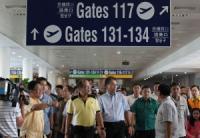
By Matikas SantosINQURER.net 6:32 pm | Tuesday, April 15th, 2014 Department of Foreign Affairs building INQUIRER FILE PHOTO MANILA, Philippines – The Department of Foreign Affairs (DFA) announced Tuesday that it has granted visa-free privileges to seven countries allowing their nationals to enter Philippines for 30 days. “Effective today, April 15, nationals of seven (7) additional countries will now enjoy visa-free privilege to enter the Philippines for a period of stay of 30 days,” DFA said in a statement. “These countries are Belize, Croatia, Kazakhstan, Kyrgyzstan, Tajikistan, Turkmenistan and Uzbekistan,” it said. The granting of visa-free privilege is seen to promote tourism and investments from the countries. “The [countries] have been emerging as key players in the international economic community and which have growing bilateral ties with the Philippines,” DFA said. “The DFA fully supports national efforts to attract more tourists and potential investors to the Philippines. In particular, the DFA, through its various embassies and consulates abroad, has been playing an active role in helping the Department of Tourism reach its target of 10 million foreign tourist arrivals by 2015,” DFA Undersecretary Rafael Seguis, said in the statement. The DFA also announced that it has removed the visa-free privilege of Somalia putting back the need for Somalis to apply for a visa at Philippine Embassies or consulates. A list of all countries with visa-free privilege, now numbering 157, is available at the DFA website at https://www.dfa.gov.ph/index.php/site-administrator/visa-information. RELATED STORY Visa-free entry for Indian nationals Follow Us Other Stories: Japan mulls no Read More …





